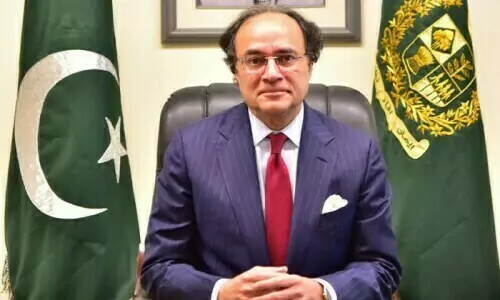Challenges for Finance Minister Muhammad Aurangzeb:
Challenges for Finance Minister, Muhammad Aurangzeb, are very complex for his amid tenure. Muhammad Aurangzeb is a seasoned figure in Pakistan's financial sector, has recently assumed the mantle of the country's finance minister. With a distinguished career, including leadership roles in major financial institutions like Habib Bank Limited (HBL) and JP Morgan, Aurangzeb brings a wealth of experience to his new position. However, his tenure begins amidst a backdrop of significant economic challenges that demand urgent attention and strategic intervention.
The Economic Landscape

Pakistan's economy faces a myriad of interconnected issues, ranging from soaring inflation and rampant unemployment to substantial budget and current account deficits. Addressing these challenges requires a multifaceted approach that balances short-term stabilization measures with long-term structural reforms. Aurangzeb steps into his role at a critical juncture, tasked with navigating the complexities of Pakistan's economic landscape.
Immediate Priorities
Aurangzeb's immediate focus lies in negotiating with the International Monetary Fund (IMF) to secure a new economic bailout package. Swift implementation of reforms is paramount, as Pakistan aims to avoid a looming current account crisis. This entails concluding the existing IMF program and initiating negotiations for a new, more extensive arrangement. Aurangzeb's commitment to decisive action underscores the urgency of stabilizing Pakistan's economy and restoring investor confidence.
Debt Restructuring
The finance minister must also grapple with Pakistan's alarming debt profile, characterized by unsustainable borrowing and spending patterns. Debt restructuring emerges as a critical imperative, requiring careful navigation of domestic and external liabilities. Aurangzeb faces the daunting task of managing the country's debt burden while ensuring fiscal sustainability. This includes renegotiating terms with creditors, exploring debt rollovers, and mitigating the risks of sovereign default.
Managing Political Pressures
In addition to economic imperatives, Aurangzeb must navigate the intricate dynamics of political pressures. Balancing the demands of the ruling party with the necessity of implementing tough reforms poses a formidable challenge. The finance minister's ability to steer clear of populist measures and prioritize the long-term interests of the economy will be closely scrutinized.
Formalizing the Informal Sector
Pakistan's informal economy presents a significant challenge in terms of tax evasion and illicit financial activities. Aurangzeb aims to formalize this sector, thereby expanding the tax base and enhancing revenue generation. However, this endeavor requires robust regulatory frameworks, investment in digital infrastructure, and incentives for informal businesses to transition to the formal economy.
Energy Sector Reforms
Reforming Pakistan's energy sector is another pressing priority for Aurangzeb. Addressing circular debt, promoting renewable energy sources, and improving efficiency are key objectives. Collaborating with relevant stakeholders, including power distribution companies and international partners, is essential to effecting meaningful change in this critical sector.
Privatization Agenda
Aurangzeb advocates for the privatization of state-owned entities as a means of enhancing efficiency and attracting investments. Initiatives such as the privatization of Pakistan International Airlines (PIA) aim to streamline operations and reduce the burden on the government. However, navigating the complexities of privatization processes demands strategic planning and stakeholder engagement.
Restoring Investor Confidence
Restoring investor confidence is paramount to stimulating economic growth and attracting foreign investment. Aurangzeb must demonstrate a commitment to sound economic policies, transparency, and governance reforms. By fostering a conducive environment for businesses and investors, Pakistan can unlock its economic potential and spur sustainable development.
Transition to Export-Based Economy
Transitioning from a consumption-driven economy to one that is export-oriented is essential for long-term prosperity. Aurangzeb seeks to bolster Pakistan's export sector through policy measures aimed at enhancing competitiveness and diversifying export markets. By harnessing the country's comparative advantages and fostering innovation, Pakistan can unlock new avenues for economic growth.
Conclusion
As Muhammad Aurangzeb embarks on his journey as Pakistan's finance minister, he faces a formidable array of Challenges for Finance Minister that demand bold leadership and strategic vision. By prioritizing economic stability, implementing structural reforms, and fostering an environment conducive to investment and growth, Aurangzeb can steer Pakistan towards a path of sustainable development and prosperity. However, success will hinge on his ability to navigate the complexities of Pakistan's economic landscape and garner support for his reform agenda.
Related Article:

